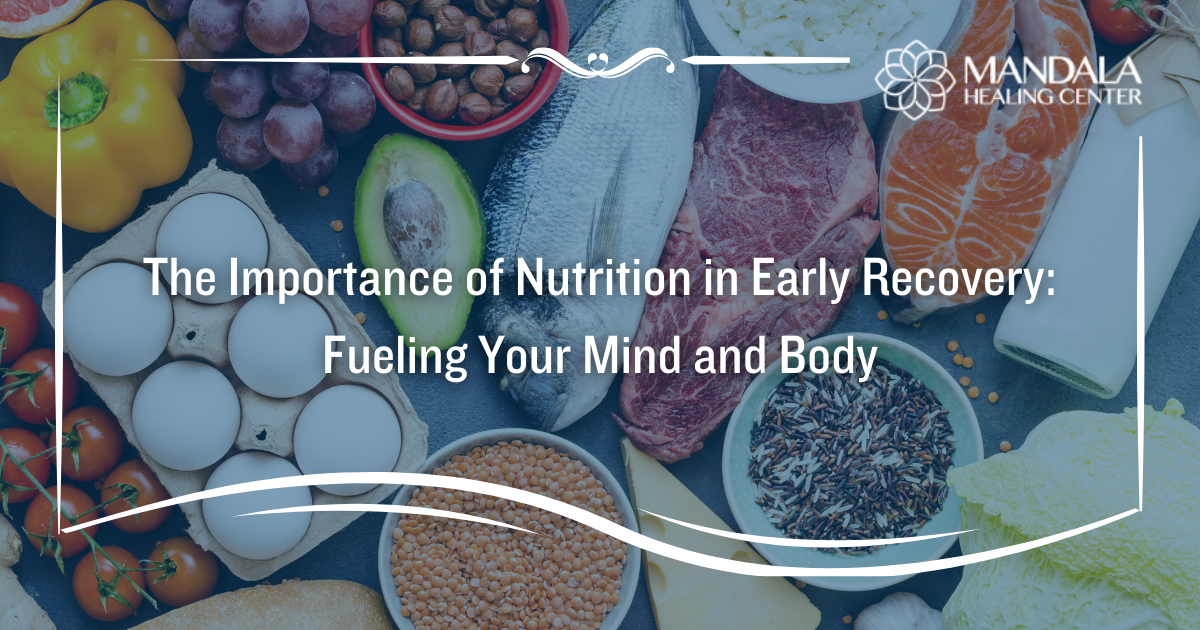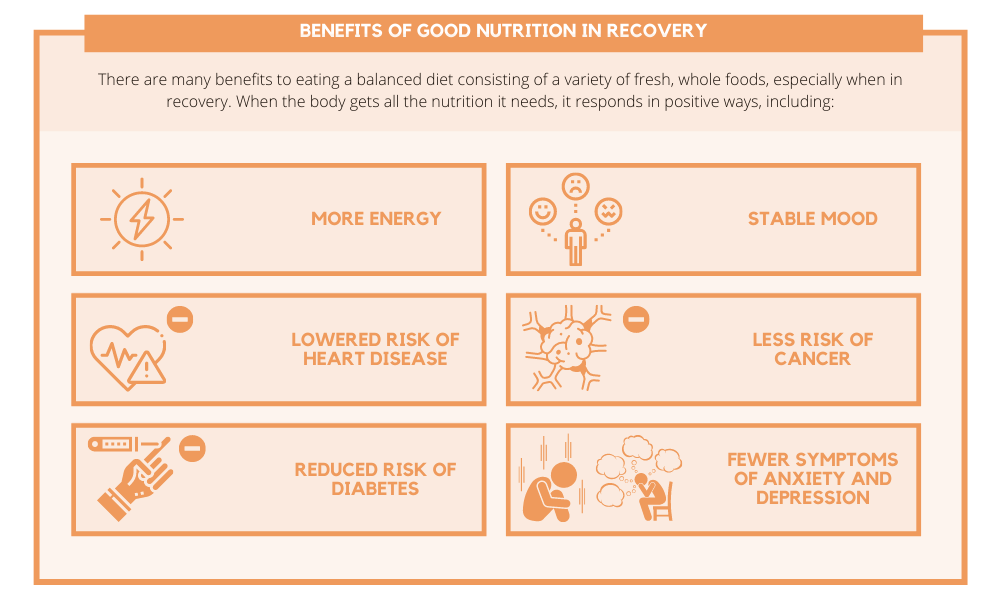Good nutrition keeps your body and mind feeling good and functioning well. Eating well becomes even more important when you are in detox. Your body is very good at removing harmful substances and toxins, but the process can sometimes result in uncomfortable physical and psychological symptoms. Focusing on nutrition in recovery and in detox can help you get through the detox period as comfortably as possible.
Benefits of Good Nutrition in Recovery
There are many benefits to eating a balanced diet consisting of a variety of fresh, whole foods, especially when in recovery. When the body gets all the nutrition it needs, it responds in positive ways, including:[1]
- More energy
- Stable mood
- Lowered risk of heart disease
- Less risk of cancer
- Reduced risk of diabetes
- Fewer symptoms of anxiety and depression
In detox, your body works hard to eliminate toxins and return to its balanced, natural state. When your body receives all that it needs from the foods you choose, it will work well and be able to begin its important work of healing.
How Does Addiction Affect Nutrition?
Substance abuse is known to affect people’s physical health in many ways. Using drugs or alcohol can affect people’s eating habits and overall nutritional health.
When using substances, people tend to eat irregularly. They may choose less nutritious foods or skip meals entirely. Irregular eating habits can result in hypoglycemia, which means blood sugar levels that are too low. People may have less energy or experience side effects like vomiting or diarrhea. They may gain or lose weight rapidly.
Some people develop serious gastrointestinal conditions like irritable bowel syndrome (IBS). Alcohol is also known to negatively impact the digestive enzymes and gut flora. During detox, the body starts to eliminate the substances that contributed to the imbalance and return to a state of balance and normal functioning.
Nutrition to Support Detox in Recovery
You may not feel like eating much during the early days of your detox process. Listen to your body and focus on staying hydrated as much as possible. Drink a lot of water. Try herbal tea, sparkling water, juice, or flavored water if you struggle to drink enough plain water.
When your appetite begins to return, focus on eating nutritionally dense foods. Things like avocados, fruit, brown rice, cheese, beans, lean meat, and whole-grain bread and crackers contain good nutrients, healthy fat, and fiber, even in small amounts. This makes them good choices if you don’t feel ready for large meals but want to take in some good nutrition.
Eat Better, Feel Better
The foods you choose can have a big impact on how you feel. Mood and sleep are affected by nutrition. Eating irregularly or having a diet that lacks real nutrients can leave people feeling depleted, anxious, and irritable.
Poor nutrition or low blood sugar can lead to major sleep interruptions or insomnia in recovery. The reverse is also true—a diet consisting of highly nutritious foods can result in steadier blood sugar and mood, and deeper, more refreshing sleep.[2]
Nutrition for Mood
Detox is the body’s natural process of eliminating toxins. As your body rids itself of substances during the detox period, you may have some uncomfortable psychological symptoms like anxiety and depression. Eating nutritious foods can help you alleviate some of these symptoms.
Eating regularly keeps your blood sugar stable, which can result in more stable moods. Giving your body the nutrients it needs can mean that you experience fewer withdrawal symptoms. You might experience more patience and better sleep. Good nutrition gives you the energy you need to do all the important, healing work you need to do during the detox period.[3]
Nutrition as Self Care
Part of detox includes learning how to care for your body and mind. For many people, it may be a time of reflection and learning how to listen to their bodies.
The act of eating well can be a form of self-care. Taking time to think about what your body is asking for and then responding mindfully is a powerful way to recognize your own self-worth.
Choosing to take time to prepare healthy foods, to eat regularly, and enjoy your food is a meaningful way to care for both your body and mind during detox. The simple act of feeding yourself well reinforces the truth that you are worthy of care, love, and a new start.
How Should I Eat in Detox?
While you may feel nauseated or lack appetite in the beginning, over time you will begin to feel hungry again. Focus on eating and drinking regularly as soon as you are able. Have healthy, easy-to-eat foods like hard-boiled eggs, string cheese, whole wheat bread or crackers, and pre-cut fruits and veggies on hand.
As much as possible, eat a wide variety of foods. Make sure you are getting a complete range of vitamins and minerals. You can do this by eating whole, fresh foods like fruits, vegetables, and lean meat, beans, or eggs. Increase your intake of fiber to help restore the gut flora and aid digestion. Delicious, fiber-rich foods include:
- Beans
- Cruciferous vegetables—cauliflower, brussels sprouts, cabbage, broccoli
- Berries
- Whole grains
- Leafy Greens
Start by eating small amounts of these fiber-rich and nutritionally-dense foods when your appetite starts to return and then increase the amount you eat over time. In general, limit or avoid highly processed fast food and sugar, alcohol, and caffeine. Doing these things and focusing on nutrition in early recovery will help prepare you to take care of your mind and body throughout your sobriety.
See The Benefits of Nutrition in Recovery For Yourself at the Mandala Healing Center
If you or someone you love is struggling with addiction, you do not have to go through it alone. The staff at the Mandala Healing Center work to empower people to recover from addiction and learn how to live full, healthy lives. We offer drug and alcohol treatment programs that use evidence-based and holistic therapies to care for people—mind, body, and soul. If you are ready to take the first step toward recovery, we will walk the rest of the way with you. Call [Direct] or fill out an online intake form here.
References:













